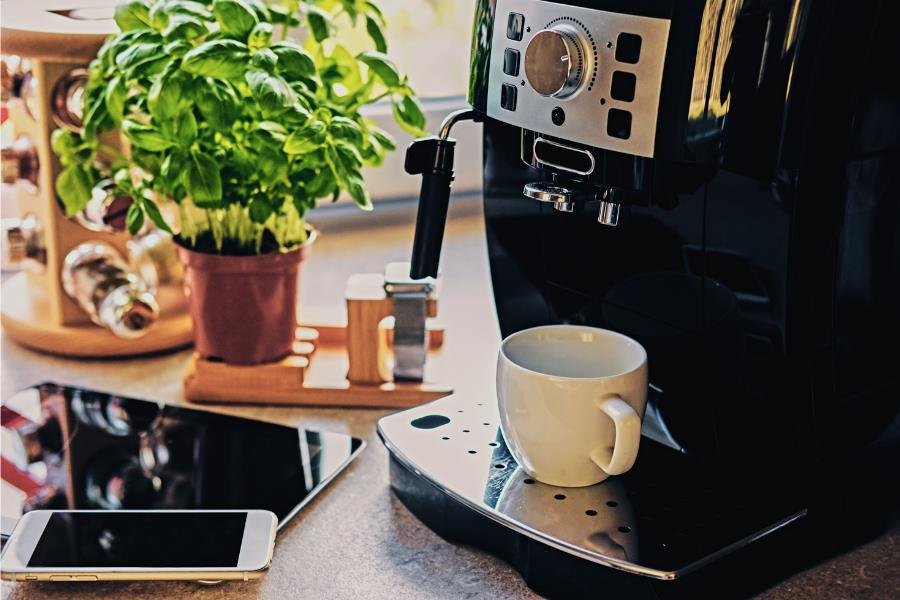Buying an espresso machine for the first time can be overwhelming. You are surrounded by so many different options, each of them boasting its own unique features and benefits.
And then there’s all that jargon to contend with — what does it mean when someone talks about pre-infusion or a PID controller, anyway?
To help you out on your journey to finding the perfect espresso machine, we’ve put together 9 essential tips just for first-time buyers.
Ahead, advice from experts and seasoned coffee connoisseurs who have gone through this process before — plus insights into common pitfalls and potential mistakes they wish they’d known earlier in their journeys.
So if you’re wary of even dipping your toes in the exciting world of coffee-making equipment, read on — this post is just for you!
Define Your Budget:
If you’re on a tight budget, you can easily find a decent starter machine in the range of $100-$300. These models typically provide basic features like a single or double shot option, steaming wand, and cup warmer.
However, keep in mind that you may need to purchase a grinder separately, which can add a few extra bucks to your overall cost.
If you’re looking for a coffee machine with more benefits, you may need to invest between $400-$1000. This range of machines will offer features like programmable settings, larger water tanks, and better steamers.
Additionally, some machines may include a grinder or other accessories that can further enhance your coffee experience.
For the high rollers who desire the ultimate in coffee luxury, there are espresso machines that can range anywhere from $1000-$10,000. These machines are usually designed for commercial use, but if you have the budget, they can be a great addition to any home.
They come equipped with top-of-the-line features like multiple group heads, high-capacity boilers, and built-in grinders. However, these machines also require a lot of maintenance and upkeep, including regular cleaning and descaling.
Consider the Type of Espresso Machine:
There are three main types: manual, semi-automatic and super-automatic espresso machines.
Manual (lever) espresso machines offer the most control by allowing the user to manually apply pressure to pull the shot. This type of machine is perfect for experienced baristas who want to experiment with different brewing techniques and achieve optimal espresso flavours.
However, the manual process requires a steep learning curve and may not be suitable for novice baristas.
On the other hand, semi-automatic espresso machines provide a balance of control and convenience. With these machines, users can still control the extraction time but the machine handles the water pressure automatically.
This type of machine is popular for home use as it demystifies the espresso-making process, providing an excellent entry point for novice baristas or coffee enthusiasts.
Super-automatic espresso machines aka bean-to-cup offer the most convenience as they handle almost all the brewing process, including grinding, tamping, and extraction, making the entire brewing process easier and quicker.
However, these machines offer less control, making it difficult to achieve the perfect espresso shot or experiment with brewing techniques.
Consider the Size and Capacity:
A compact and sleek machine is best suited for making a single cup of espresso at a time, occupying minimal counter space. On the other hand, larger machines designed for multiple cups may consume more space but are perfect for serving a group of people.
The size and capacity of an espresso machine directly influence its performance, as the amount of water, coffee, and steamed milk it can hold is limited by its design.
Thus, if you are an avid coffee lover who enjoys a quick caffeine fix at home, it would be wise to opt for a smaller machine with a single-shot capacity.
However, if you frequently entertain guests or have a family who loves coffee, a larger machine with a high cup capacity would be an ideal investment.
Evaluate the Boiler Type:
Espresso machines can have single boilers, dual boilers, or heat exchangers. Each type affects the machine’s performance and capabilities:
Single Boiler machines can brew and steam, but not at the same time. They are generally more affordable.
Dual Boiler machines have separate boilers for brewing and steaming, allowing for simultaneous tasks. They are more expensive but offer better temperature stability.
Heat Exchanger machines use a single boiler with a tube or heat exchanger to separate brewing and steaming functions. They provide a good balance of performance and cost.
Consider Additional Features:
Some espresso machines come with extra features like programmable shot settings, PID temperature control, built-in grinders, and milk frothers.
Programmable shot settings let you customize the amount of brewed espresso, ideal if you prefer a specific quantity. PID temperature control ensures consistent heating for reliable results.
Built-in grinders save time and money, eliminating the need for a separate grinder. Milk frothers create the perfect foam for various espresso-based drinks.
However, additional features often come with a higher price. They enhance the coffee experience but may not be necessary for everyone. Some prefer machines with fewer features for more brewing control.
Ease of Cleaning and Maintenance:
When buying an espresso machine, consider factors like ease of cleaning, accessibility of internal components, and self-cleaning features. Regular cleaning ensures your machine stays in good condition, improves taste, and avoids costly repairs.
Machines with removable parts allow for thorough cleaning. Easily accessible components and self-cleaning features, like automatic descaling, make maintenance easier.
One example is the DeLonghi Dinamica Plus line, which automatically rinses the milk system after each use. This is an invaluable feature for someone who drinks a lot of milk drinks like latte or cappuccino.
Consider Brand Reputation and Customer Support:
A brand’s reputation reflects its performance over time. Good reputation entails consistent delivery of quality products and services, establishing dependability and trust with customers.
Choosing an espresso machine from a reputable brand such as Breville or DeLonghi ensures reliability and an excellent coffee experience. In contrast, lesser-known or untested brands may offer unreliable machines, causing frustration and disappointment.
Apart from reputation, consider the level of customer support offered. High-quality espresso machines can still encounter issues, necessitating accessible and effective customer support.
Seek brands with comprehensive support, including in-person assistance, chat support, or detailed online resources. Reliable and efficient customer support ensures quick and effective issue resolution without long wait times or fruitless troubleshooting.
Think About Aesthetics and Design:
When buying an espresso machine, it’s important to consider both its functionality and performance, as well as its design. The appearance of the machine can enhance the kitchen’s decor, while also impacting its usability and ease of maintenance.
Additionally, a well-designed espresso machine can reflect its level of craftsmanship and quality. So, when making a purchase, pay attention to the machine’s aesthetics, ensuring it complements your kitchen and coffee preferences.
Read the Warranty Terms:
Understanding the manufacturer’s warranty is crucial. It covers defects in materials or workmanship for a certain period. Read the terms to avoid surprises.
Most machines come with a one to three-year warranty, but coverage varies. Some warranties cover parts and labour, others only cover parts. Know the details to avoid unexpected costs.
Warranties may have conditions that void coverage, such as neglect or misuse. Having a warranty saves money on repairs or replacements for defects
Get Recommendations from Baristas or Espresso Enthusiasts:
Buying an espresso machine can be a challenging process due to the variety of models and brands available. That is why seeking advice from experienced baristas or coffee enthusiasts like Ivan from Espressoverse is invaluable.
They possess in-depth knowledge of making great espresso, understand technical aspects, and have firsthand experience with various machines.
Ultimately, consulting with industry professionals ensures an informed decision for long-term satisfaction. Don’t skip this step.
Conclusion
With a bit of research and these nine tips, you can buy an amazing espresso machine that’s perfect for your home. We hope we have helped you to make a well-informed decision.
No matter which type or brand of espresso machine you choose, be sure to give yourself some time to get used to how it works best — this will result in the best coffee experience possible! Caffeinated adventure awaits — happy shopping!















